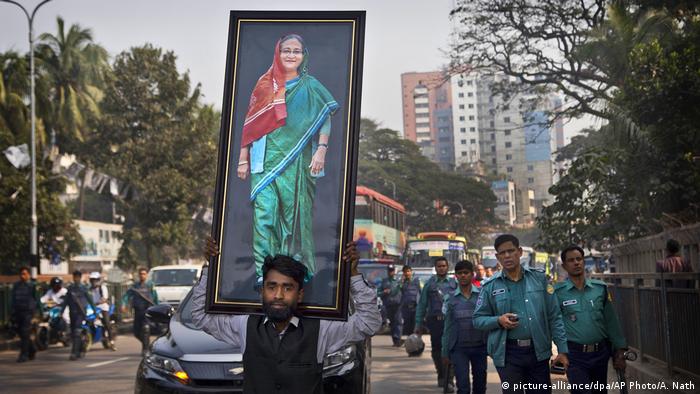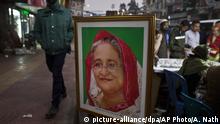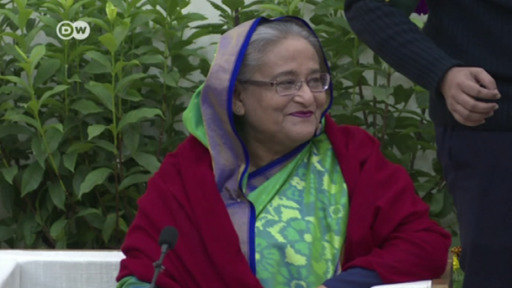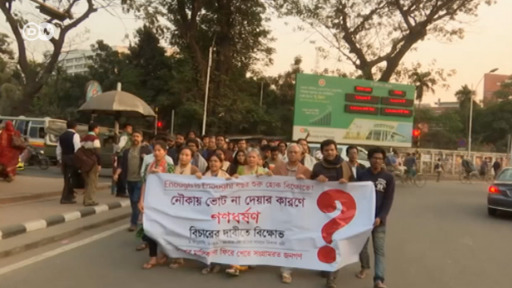West’s ‘worrying’ support for Bangladeshi PM Sheikh Hasina
Arafatul Islam 10 January 2019 DW
Despite allegations of vote rigging and voter intimidation during Bangladesh’s election in December, experts say that the West may prefer stability over confronting shortcomings in the country’s democratic process.
On December 30, Bangladesh’s ruling Awami League (AL) party won by a landslide in a national election, sending Prime Minister Sheikh Hasina to a third straight term in office.
While the AL alliance won as many as 288 seats out of 300 parliamentary constituencies across the country, the main opposition alliance led by the Bangladesh Nationalist Party (BNP), secured only eight seats.
The vote was also marred by deadly violence and opposition parties disputed the outcome, citing examples of widespread rigging and voter intimidation. Despite these claims of massive voter fraud, several countries, including India, China and Russia, took no time to congratulate Sheikh Hasina for the landslide win.
Read more: Opinion: Bangladesh’s missed chance to become a functional democracy
Western countries’ hollow criticism?
Although Western nations condemned election violence in Bangladesh, along with a range of other voting irregularities, experts say that these statements will not be followed by action.
“Violence marred the election day, and significant obstacles to a level playing field remained in place throughout the process and tainted the electoral campaign and the vote,” the EU said in a statement, calling for “a proper examination of allegations of irregularities.”
Read more: Why Bangladesh needs foreign observers during election
The US, Bangladesh’s largest foreign investor, expressed concern about “credible reports of harassment, intimidation, and violence in the pre-election period that made it difficult for many opposition candidates and their supporters to meet, hold rallies, and campaign freely.”
However, these statements by Western powers seem to have had no impact on the ruling party as well as Bangladesh’s election commission. The commission shows reluctance to investigate vote rigging claims, citing that no country in the world has rejected the election result. Moreover, a new government has already been formed based on the election outcome.
“The muted reaction of Western countries is surprising. After insisting on a ‘credible election’ these countries’ reactions are somewhat baffling to me,” Ali Riaz, a distinguished professor of political science at Illinois State University in the US, told DW. “It should also be noted that, unlike India, China and Russia, these countries have refrained from sending congratulatory messages.”
Stability over democratic process?
Michael Kugelman from the Washington-based Woodrow Wilson Center for Scholars thinks that the international community’s silence following Bangladesh’s questionable election outcome is striking.
“Much of the international community, particularly in the West, views Sheikh Hasina as a responsible world leader who has done her part to contribute to stability,” he told DW. “She has presided over smooth economic growth, cracked down hard on terror, and provided some welcome hospitable treatment to Rohingya refugees,” he said, adding that because of this, much of the world “feels no need” to pay mind to an internal matter like an election.
David Lewis, a professor of social policy at the London School of Economics, similarly said that many Western countries see Hasina as “offering relative stability” and questioning the election result “would risk more instability.”
Economic growth versus one-party state
Bangladesh’s economic potential might be another reason why Western nations have opted to ignore the controversial election result, which has turned the country into a one-party state. There have been significant Western investments in various sectors, particularly in energy and telecommunications.
On top of this, Bangladesh accepted nearly a million Rohingya refugees in 2017 after they fled Myanmar over a military crackdown. Western powers praised Hasina’s welcoming attitude towards those refugees.
“Not only is the Hasina government providing shelter, but there is also a perception that it has managed to check the potential radicalization of the refugees,” Ali Riaz said.
Read more: Bangladesh democracy at a crossroads
Europe has ‘more to do’
Dr Norbert Röttgen, the chair of the German parliament’s foreign affairs commission, thinks that European countries haven’t sufficiently voiced their concerns over election irregularities in Bangladesh.
“While on paper European governments have come to the right conclusions, they have not sufficiently voiced their concerns. This is more than regrettable,” Röttgen told DW.
“I believe that both the German government and the opposition parties should ensure that their concerns are heard by those in power in Bangladesh as well as the Bangladeshi people. As democrats, it is our task to show support for their legitimate right to vote,” he said, adding that Europe’s silence on election fraud allegations shows that Europe “doesn’t sufficiently take notice of Asia” as an important region.
“This is a severe strategic shortcoming, which Europe needs to rectify. Doing so should entail vocally speaking up in favor of human rights and democracy within the region,” said Röttgen.
Ali Riaz also thinks that Western countries have a responsibility to take a stand on the voter fraud issue, which ensured a landslide victory for Bangladesh’s ruling party.
“It’s incumbent on the international community to act and ensure that the democratic aspirations of the citizens of Bangladesh are not trampled. They can’t forget that they have a responsibility to uphold the letter and spirit of Article 21 of the Universal Human Rights Declaration,” he said.
Sheikh Hasina, whose father founded the modern Bangladeshi state, has been locked in a rivalry, switching leadership of Bangladesh for nearly three decades with BNP leader Khaleda Zia. In February 2018, Khaleda was jailed on corruption charges.
Read more: Bangladesh election: what you need to know
DW recommends
Bangladesh: A small tiger economy with big plans
Bangladesh is one of the world’s impoverished nations. Yet, its economy has been growing rapidly over the past few years, thanks in no small part to its massive textile exports. But risks are looming on the horizon. (25.12.2018)
Opinion: Bangladesh’s missed chance to become a functional democracy
By holding a free and fair election, Bangladesh could have shown to the world that it’s managed to transform itself into a functional democracy. But the country wasted the opportunity, writes DW’s Zahidul Haque. (31.12.2018)
Bangladesh election: Prime Minister Sheikh Hasina wins by landslide
A victory for Hasina’s Awami League was widely expected in an election marred by violence and rigging allegations. The opposition alliance has rejected the election as “farcical” and called for fresh polls. (31.12.2018)
Has Bangladesh’s ruling party won a ‘managed’ election?
Bangladesh’s ruling coalition has secured a landslide victory in the general polls, but critics think the Grand Alliance has won by tampering with the country’s constitutional institutions. (31.12.2018)
Bangladesh opposition leader: International community ‘shouldn’t recognize new government’
In an exclusive interview with DW, Kamal Hossain, the leader of Bangladesh’s main opposition alliance, accused PM Sheikh Hasina’s government of “manufacturing” the results of the latest general election. (31.12.2018)
Bangladesh democracy at a crossroads
Bangladesh held a general election on December 30, a vote that’s seen as crucial for the survival of democracy in the South Asian country. Follow DW’s coverage of the pivotal elections right here. (11.12.2018)
Why Bangladesh needs foreign observers during election
The EU’s decision not to send observers to monitor the upcoming general elections in Bangladesh has caused dismay among many inside and outside the country. They say the move reflects the skepticism shadowing the polls. (26.11.2018)
Bangladesh election: what you need to know
Bangladesh is looking for new direction in an upcoming election that is being hampered by political instability and accusations of electoral illegitimacy. However, voters say they expect the process to be transparent. (21.12.2018)
Audios and videos on the topic
- Date 10.01.2019
- Author Arafatul Islam
- Related Subjects Asia
- Keywords Asia, Bangladesh, West, Sheikh Hasina, election
- Feedback: Send us your feedback.
- Print Print this page
- Permalink https://p.dw.com/p/3BI1p













